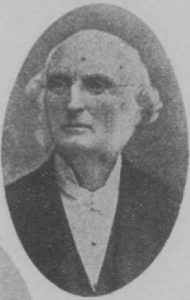Samuel Robbins Brown was a well-known missionary and teacher for the Dutch Reformed Church who went to China and Japan as a part of his efforts but is primarily known for his work with the latter. He was born in East Windsor, Connecticut, on the 6th of June, 1810. He was extremely gifted in music and teaching and would later make a living of it and pay for part of his schooling through teaching. Brown attended Yale College as a part of the class of 1832 and after then working at the Institution for the Deaf and Dumb in New York, he went to the Theological Seminary at Columbia, South Carolina, where he taught vocal and instrumental music for two years.
After graduation, Samuel immediately wanted to travel to China and offered himself to the American Board, the North American branch of the Dutch Reformed Church missionary effort. Though at the time, China was wary and somewhat secluded, in 1838, he was successful in being part of a missionary trip going to China where he focused heavily on learning Chinese and successfully established a school that would later send students back to America.
By 1858, after Matthew Perry had arrived, Japan had opened some of its ports. At fifty years old, Brown still had the energy and enthusiasm to lead another trip, likely being one of the first missionaries chosen to go to Japan. He would first live in a Buddhist temple in Kanagawa and would then spend time learning and even teaching Japanese. Brown visited various areas including Nagasaki, wanting to build the first Protestant church, and Yokohama, where he established schools, churches, and would regularly preach. Brown would also be responsible for connecting Japanese students to America, giving them too the opportunity to study abroad.
Undoubtedly, Brown had a massive impact on Japanese and American relations as he truly exemplified a curious, respectful traveler but also an earnest missionary that truly wanted Japan to succeed. Brown successfully fulfilled his own mission in educating and converting some of the Japanese and in doing so greatly helped them in connecting to the West after a long period of isolation. Most of all, Brown genuinely loved Japan and its culture, as in Brown’s own words, “If I had a hundred lives, I would give them all for Japan.”
Sources:
Griffis, William Elliot. A Maker of the New Orient: Samuel Robbins Brown, Pioneer Educator in China, America, and Japan, the Story of His Life and Work. Fleming H. Revell Company, 1902.
